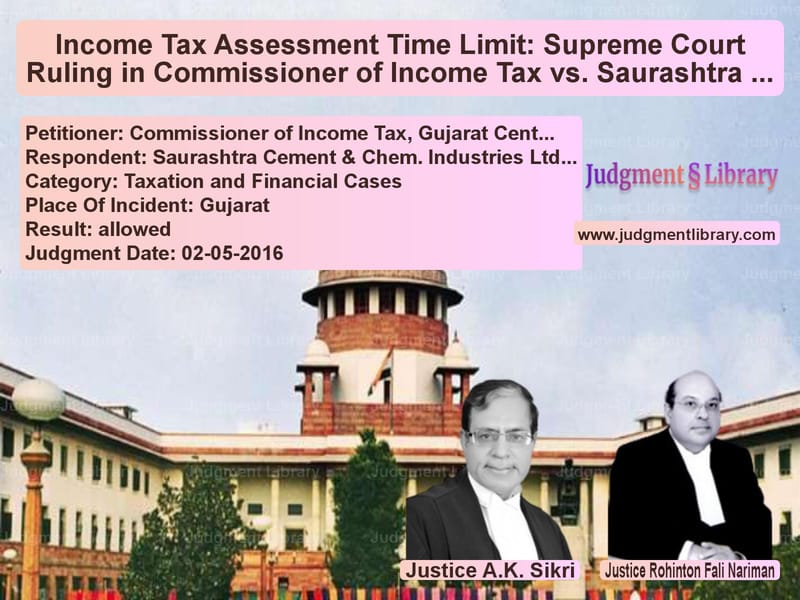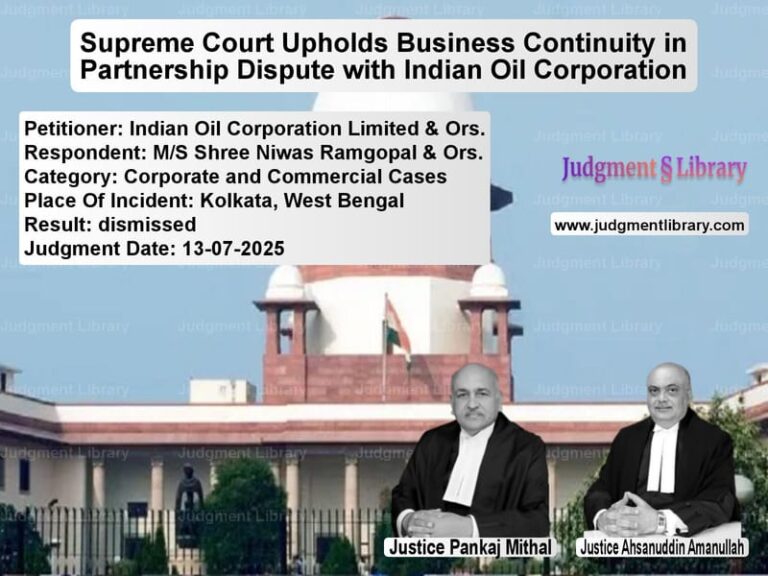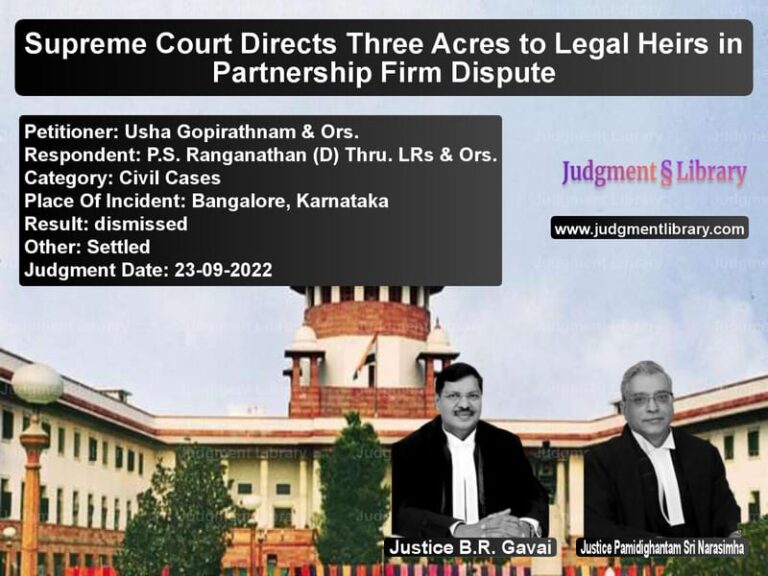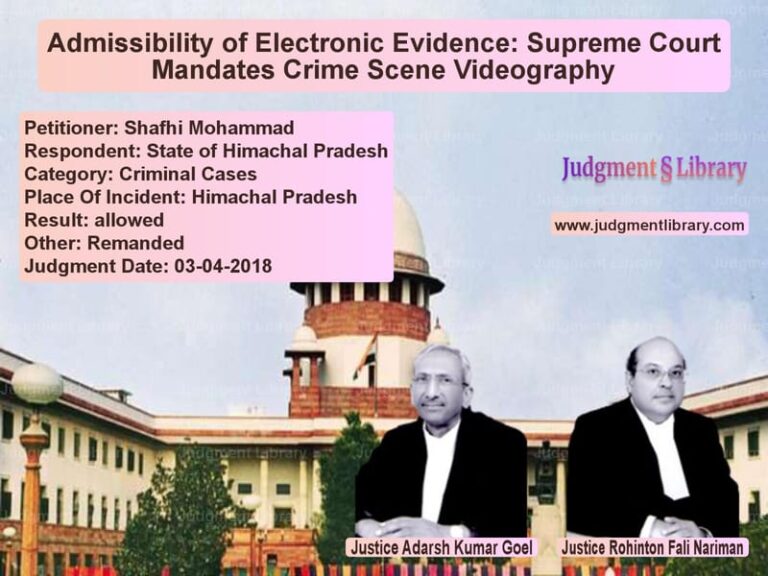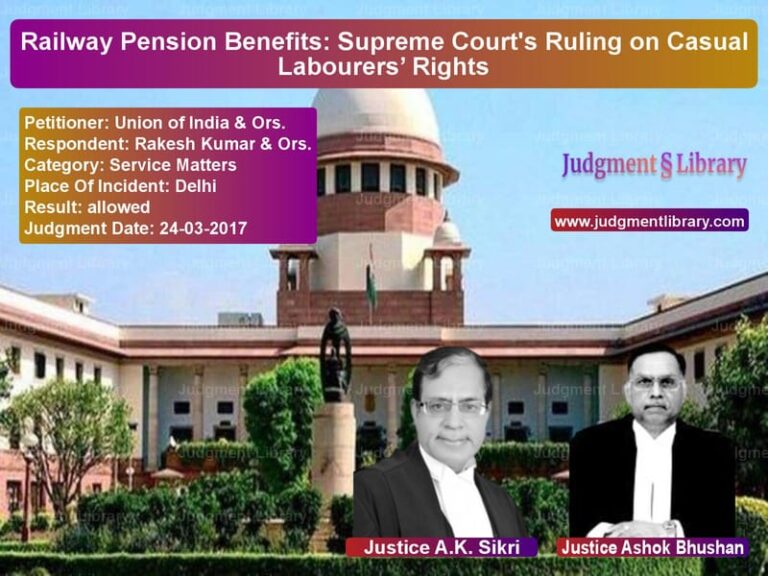Income Tax Assessment Time Limit: Supreme Court Ruling in Commissioner of Income Tax vs. Saurashtra Cement
The Supreme Court of India recently ruled on a crucial tax law dispute in Commissioner of Income Tax, Gujarat Central vs. Saurashtra Cement & Chem. Industries Ltd.. The case primarily concerned the interpretation of the time limit for completing an income tax assessment under Section 153 of the Income Tax Act, 1961, and whether a delay caused by referring a draft assessment to the Inspecting Assistant Commissioner (IAC) could be excluded from the computation of the limitation period.
Background of the Case
The dispute arose from the assessment proceedings of Saurashtra Cement & Chem. Industries Ltd. (the respondent) for the financial year 1981-82. According to Section 153(1) of the Income Tax Act, the assessment order had to be completed within two years from the end of the relevant assessment year. This meant that the assessment for 1981-82 should have been completed by March 31, 1984.
However, the Assessing Officer (AO) passed the final assessment order on September 1, 1984, beyond the stipulated deadline. The Revenue argued that this delay was justified because a draft assessment order was forwarded to the IAC on March 13, 1984, and the IAC issued directions under Section 144B on August 31, 1984. Since the case was pending before the IAC, the Revenue claimed that this period should be excluded from the calculation of the limitation period.
Arguments by the Revenue
The Revenue contended that:
- The period between March 13, 1984, and August 31, 1984, when the draft assessment was pending before the IAC, should be excluded under Explanation 1(iv) to Section 153.
- The reference to the IAC was a mandatory step under Section 144B and was required before finalizing the assessment.
- Since the IAC had jurisdiction over the matter, the delay was unavoidable and should be considered within the permissible limits of the Income Tax Act.
Arguments by the Assessee
The respondent (Saurashtra Cement) argued that:
- By an order dated August 29, 1983, the Commissioner of Income Tax (CIT) had assigned all assessment powers of the Income Tax Officer (ITO) to the IAC under Section 125A of the Act.
- Since the IAC was already empowered to complete the assessment, there was no need for the ITO to refer a draft assessment to the IAC under Section 144B.
- The reference to the IAC was unnecessary and did not extend the limitation period under Section 153.
High Court’s Ruling
The Gujarat High Court ruled in favor of the assessee, holding that:
“Once the IAC was conferred concurrent jurisdiction to make an assessment, the forwarding of a draft order under Section 144B was redundant. The limitation period under Section 153 should not be extended on account of an unnecessary procedure.”
The High Court thus dismissed the Revenue’s appeal and held that the assessment order was time-barred.
Contradictory Judgment from the Allahabad High Court
In a similar case, Commissioner of Income Tax vs. Saraya Sugar Mills Pvt. Ltd., the Allahabad High Court had ruled in favor of the Revenue, holding that:
“The period spent in obtaining directions from the IAC should be excluded from the limitation period under Explanation 1(iv) to Section 153.”
Given the conflicting judgments from two different High Courts, the matter was taken to the Supreme Court.
Supreme Court’s Judgment
The Supreme Court, comprising Justice A.K. Sikri and Justice Rohinton Fali Nariman, ruled in favor of the Revenue, overturning the Gujarat High Court’s decision. The key observations made by the Court were:
- The IAC had concurrent jurisdiction under Section 125A, but this did not eliminate the applicability of Section 144B.
- The purpose of Section 144B was to ensure that high-value cases received additional scrutiny from a senior officer before a final assessment was made.
- “The period (not exceeding 180 days) during which the draft assessment order is pending before the IAC must be excluded from the computation of the limitation period under Section 153.”
The Court emphasized that procedural compliance with Section 144B was necessary to maintain consistency in tax assessments. The ruling also affirmed the correctness of the Allahabad High Court’s judgment in the Saraya Sugar Mills case.
Final Verdict
- The Supreme Court set aside the Gujarat High Court’s ruling.
- The assessment order issued on September 1, 1984 was held to be valid as the period spent before the IAC was excluded from the limitation period.
- The ruling in Saraya Sugar Mills Pvt. Ltd. was upheld.
- The Revenue’s appeal was allowed with costs.
Implications of the Judgment
This ruling has significant implications for tax administration and assessment procedures:
- Clarification on Time Limits: It establishes that the period during which an assessment order is pending before the IAC should be excluded from the two-year limitation period under Section 153.
- Reinforcement of Section 144B: The decision upholds the necessity of additional scrutiny in cases with significant tax implications.
- Standardization of Tax Procedures: The ruling ensures uniformity in how limitation periods are computed across different tax jurisdictions.
Conclusion
The Supreme Court’s ruling in Commissioner of Income Tax vs. Saurashtra Cement is a landmark decision that clarifies the application of limitation periods in tax assessments. It reaffirms the necessity of procedural compliance and provides greater clarity to both tax authorities and taxpayers regarding assessment timelines.
This decision serves as an essential reference for future tax litigation and strengthens the legal framework for income tax assessments in India.
Don’t miss out on the full details! Download the complete judgment in PDF format below and gain valuable insights instantly!
Download Judgment: Commissioner of Inco vs Saurashtra Cement & Supreme Court of India Judgment Dated 02-05-2016-1741860875278.pdf
Direct Downlaod Judgment: Direct downlaod this Judgment
See all petitions in Income Tax Disputes
See all petitions in Tax Refund Disputes
See all petitions in Judgment by A.K. Sikri
See all petitions in Judgment by Rohinton Fali Nariman
See all petitions in allowed
See all petitions in supreme court of India judgments May 2016
See all petitions in 2016 judgments
See all posts in Taxation and Financial Cases Category
See all allowed petitions in Taxation and Financial Cases Category
See all Dismissed petitions in Taxation and Financial Cases Category
See all partially allowed petitions in Taxation and Financial Cases Category

